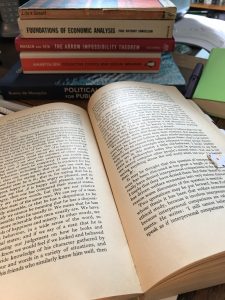One of the fundamental assumptions in economics is the existence of clearly assigned property rights with legal recourse if these are breached. It is rarely written down in the lists of assumptions taught to students but it was a central part of the brilliance of Ronald Coase that he highlighted the important role of property. In fact, there are norms as well as rights, the things one takes for granted in making a purchase or sale about what’s included and excluded in the transaction. For instance, when you buy a meal in a restaurant, the assumption on both sides is that you’re buying the food but will not be entitled to take the plate and glass away with you. Some hotels clarify one area of ambiguity by posting notices announcing that if you like the bathrobe so much you can purchase one in reception to take home; but many of assume we’re allowed to take the little bottles of shampoo.
The transformation of so many physical items into digitised ones is making old assumptions about property rights contentious. One fascinating example is the case John Deere tractors have taken to US copyright courts claiming farmers can no longer fix their tractors but have to take them to an approved agent and pay the company – because the company has not transferred the digital rights to the software now operating hi-tech tractors.
The End Of Ownership: Personal Property in the Digital Economy by Aaron Perzanowski and Jason Schultz (both law professors) has lots of examples (including the John Deere one) of the shifting notion of ownership, and the terrain this opens up for contests. The book is in the spirit of Lawrence Lessig’s Free Culture and other authors who have worried about the massively expanded scope of DRM. Although less in campaigning mode, the authors of this book argue that personal property rights over digital items need far greater clarity, and should have due legal protection. If you own something, you should be able to transfer it, for example. They write:
“The label ‘property’ carries a great deal of rhetorical force. That’s why patent and copyright holders have adopted the language of property, and why they have seen such success in the courts and Congress in their efforts to strengthen, expand and extend those rights. But … what counts as property, the rules and exceptions, and the way we resolve conflicts between property owners, are things that cange over time.”
They are not against non-ownership, but argue the terms of this – rental in effect – must be clear and not buried in terms of use documents. No company should be able to repeat Amazo’s surprise move in 2009 of deleting copies of George Orwell’s 1984 that readers thought they had purchased to own. The authors make some specific suggestions – for instance, they suggest courts should stop seeing licensing agreements as contracts, and regulators should consider banning ‘buy now’ buttons for digital goods that the provider intends to retain ownership of. DRM should be reformed with an update of the DCMA (“a major policy misstep”). Above all, they argue for reform of copyright law, to restore the economic balance between ensuring there are adequate incentives to innovate and create and spreading as widely as possible the consumer benefits of innovation.
The End of Ownership also mentions in passing the latest manifestation of a temporary access world, the ‘sharing economy’. Digital platforms are making it a bit less necessary or desirable to won a car, or a holiday home. But these are physical assets so actually do not seem all that relevant to the main themes of the book.
It’s a bit lawyerly, and American (although US law in this area has had global effects). Nevertheless a very thought provoking read. Not that I see US lawmakers leaping to respond to its proposals just at present.
[amazon_link asins=’0262035014′ template=’ProductAd’ store=’enlighteconom-21′ marketplace=’UK’ link_id=’3f3cd293-8819-11e7-8dda-b1918211891d’]


